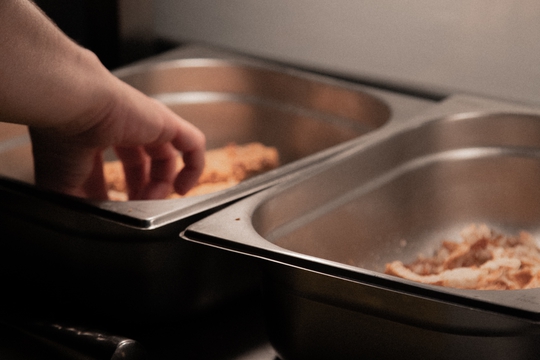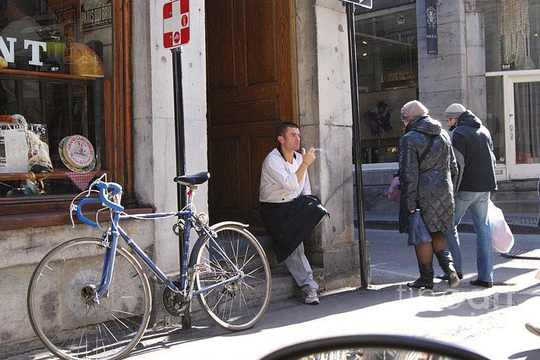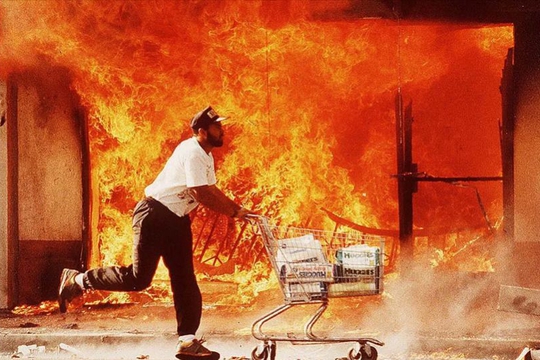Cooking behind closed doors: a dark kitchen inquiry
by
An anonymous Dark Kitchen Worker
September 21, 2023
Featured in Seeds of Struggle: Food in a Time of Crisis (#18)
A sobering glimpse behind the curtain of on-demand food production for delivery apps in a “dark kitchen”.

inquiry
Cooking behind closed doors: a dark kitchen inquiry
by
An anonymous Dark Kitchen Worker
/
Sept. 21, 2023
in
Seeds of Struggle: Food in a Time of Crisis
(#18)
A sobering glimpse behind the curtain of on-demand food production for delivery apps in a “dark kitchen”.
I started working in the dark kitchen after I heard about it from a friend. He was leaving the job and recommended it to our friend group. A dark kitchen is a way of organising food preparation for delivery, usually on demand once an order comes in through a delivery app. The “dark” refers to the lack of any capacity for customers to walk in and order. There are now dark kitchens spread across many cities, with many set up during the pandemic. However, unless you know where they are, you might not even know about them.
When explaining dark kitchens, my friend told us: “Who wants a job, easiest job in the world? You can just do nothing all day and not have a manager tell you what to do. But you will have to run a kitchen.” I was looking for work and thought I would try it. I wouldn’t have found it without my friend as the company didn’t advertise the job. They were really cheap and wanted to save as much money as they could.
I contacted the company and I got started fairly easily. I had worked in food preparation in the service industry before, but only things like making sandwiches in a pub. I had never worked in a kitchen before. However, having spoken with the boss for about ten minutes they took me on without much hassle at all.
The Dark Kitchen
The workplace was in an old converted warehouse. It was in an industrial estate behind student halls, with a big car park at the front where all the riders waited to collect deliveries. As you come into the site you have to cross the dispatch area, where all the orders are picked up from. There is the main office with the site manager who periodically barks orders at everyone. Once through the office, there is a corridor, along which there are around seven little kitchen “pods.” These are really small workstations - each one had four or five people constantly making orders in them.
The shift patterns were from the time we opened at 10 am until about 10 pm. They were usually organised with shifts split with one person on from about 10 am until about 5 pm and then another person from around 2 pm until 10 pm. It was usually close to this, but it changed a lot in practice. The timings were relatively arbitrary, and they chose the shifts to put people on as and when they needed them. I wasn’t on a zero-hour hours contract, but my shift patterns were completely dictated by the needs of the company. I lived quite far away from the dark kitchen and I had to work a lot of nights. They also always wanted you to work weekends as the orders were higher. They would also only release the rota a week in advance, which made it hard to plan what I was doing from week to week.
During a shift, the orders would come through on a tablet with a pinging sound. It was all algorithmically managed, so there is no manager coming and checking on you. This meant that the whole process was directed by an algorithm on a computer saying “Do this, now do that, you’ve got this much time for that.” This had some benefits - no boss breathing down my neck constantly - but it also meant spending a lot of time working on my own. And the boss wasn’t gone, only one step removed thanks to the technology.
On a typical shift when it was my turn to start at 10 am, I would come in on my own. I would start by turning everything on, and filling up the big pasta boiling machines with water. Then I would wipe everything down ready for service. That was the bare minimum that I could get away with doing, for a good few hours. We would start getting these big deliveries of trays of fresh pasta that needed portioning up into little bowls, ready to go out one per order. I would usually spend about an hour doing that. An average day would have about two or three hours doing nothing - maybe there would be a few orders over lunch, but not many. In the downtime, I would just sit on my phone listening to podcasts, watching youtube, going on social media.
For the actual production of food, you would boil the pasta for two minutes, get the sauce out of a pot, put it in a bowl and microwave it for two minutes. You combine the cooked pasta and sauce, put it back in the bowl and it is ready to go. Then I would just pop a lid on it, put it in a bag, drop it on the dispatch shelf, and then a rider takes it to the customer. All this costs a customer around £12 per meal! That was it for the work process, so it was very easy.
Later in a shift, things could get really busy. We would use a little handheld tablet, a bit like what you might find in a takeaway restaurant, which made a little sound when orders came in. It would print out a receipt which said you have a delivery rider coming in 15 minutes: “Go go go, you’ve got to do it.” If you don’t get it out on time, you get behind and site managers are yelling “Where’s the order?!” There’s all these ratings that are monitoring your speed, and if you go just a bit too slow then your own manager will be on your case saying its not good enough.
On the busiest days we would make fifty orders, an average day it would be twenty, or on a really quiet day it was about ten. It was really hit-and-miss. The business itself was quite disorganised, with all these dark kitchens dotted around. There seemed to be a big disconnect b/etween what we were doing and what the company was actually doing. We ourselves didn’t have much of a clue about how the company worked. They didn’t have much input into what we were doing or how we were making the food. If there were more human beings involved it would probably have been different, but it was all going off computers and data rather than any real interactions.
Isolation in the Kitchen
It was quite possible to have a day working there in which you wouldn’t talk to anyone. For some shifts, I might be with one other person, but others would be alone. Even putting the order on to the dispatch hot plate didn’t require a conversation. The drivers would get directed through the app to pick up an order and where to take it, so there wasn’t any reason to interact. It was all quite separate. I used to think that it was also probably quite easy for the delivery riders to go a whole day without talking to anyone too.
I felt really isolated at work, like being stuck in a tiny little stainless steel coffin. You didn’t have much reason to go outside, other than for a smoke or a break. It was also freezing in the winter. To be honest, it was all a bit grim. It was odd because this was a space full of people working next or near to you. There were probably about twenty or thirty people working there, but because of how it was organised, no one really got to talk to each other that much.
Sometimes we would go and hang out in the other kitchens. During downtime, we would make each other food and give it out for free. The company was actually quite relaxed about that, which was a bonus. This was probably the main way I had contact with other people at work. There was no reason to talk as part of the labour process, but chatting for a bit on the side or sharing food was one way to meet colleagues. There was a lot of turnover, with quite a lot of people coming and going in the workplace. There were staff who worked for the kitchens and then some who were directly employed by Deliveroo.
There was one person who worked directly for Deliveroo and he filled us in on how things worked. He explained what we could get away with, what we might get caught doing, what to watch out for, and so on. He would spend a lot of time going around and talking to people. He explained to us that there was a lot of CCTV everywhere in the building. Some of the cameras in the corridor and the smoking area also recorded sound.
The workplace was quite racially divided. My kitchen was all white people in their twenties. Another kitchen was Chinese men in their fifties and another was all people from the Philippines about our age. The all-white deliveroo managers generally had a very different relationship with us than the other workers. Some had close personal friendships outside of work with people in my kitchen, whereas their relationship to the Chinese workers was mostly limited to ordering them about. Whilst this didn’t create full-blown animosity between kitchens, the division and preferential treatment was definitely felt.
It was difficult to build a relationship with delivery drivers as they would be there for at most a couple of minutes. They were always in a rush to get their order and go. There would be some people who would come regularly, but I would be in the kitchen down the corridor when they arrived. Some of the people who worked for the site would get to know them quite well over time. When we did get the chance to talk, we would chat about what it was like to be a rider, the company and that you are self-employed (but not really). The discussions about strikes of riders didn’t filter into the kitchen. It was all kept quite separate.
For all of these reasons, the workplace was quite fractured and it was difficult to point to a sense of unity between all of us. While on a structural level we really didn’t work for different people, we were all technically working for different companies. All of this separation felt like it was by design.
A Future of Work
It was really interesting working in the dark kitchen because it felt like you were on the frontier of “hacking” work. There was so much faith being put in algorithms and having management done by computers instead of supervisors. Sometimes there would be a supervisor in, but they were basically doing the same stuff as us. Occasionally they would get a big manager to come in and tell us to do something differently. He would have a go at everyone and say “I want us to do it this way now.” But aside from that he didn’t really care, and he really didn’t have much way of enforcing this stuff once out of the kitchen.
This was a new system of organising work, where the management is mostly done by a computer. However, you do have a sort of autonomy that you don’t get in other workplaces. You don’t have to look over your shoulder every five seconds. No one is telling you not to go on your phone. In some ways it’s more brutal than other kinds of work simply because of the raw isolation of it all. Even with the downtime where everyone sits on their phone, you’re still just getting passed between algorithms rather than making any meaningful connection with fellow workers.
Technically, I was employed by one particular company, a pasta restaurant. The pasta is made by the company in their big kitchen in London. They then ship it out to dark kitchens like this all around England. There are loads in London, but also in cities across the country. They have one physical restaurant in London, but for their project they are predominantly a company that makes sales through dark kitchens. It feels like a bit of a grey area because legally we are employed by these individual companies, but there is also a great deal of power that Deliveroo has over us too.
This meant we were managed by different people. We might get told to stop making loads of noise or being antagonistic about the kitchens or whatever, and Deliveroo would intervene. But if there was any issue within the individual kitchen pod itself, then Deliveroo would say that they couldn’t intervene and that it wasn’t their remit. Numerous complaints came from kitchen staff about the shoddy state of the building. Despite its flashy Deliveroo branding, the building was quite old and the pipes were knackered, so everything was breaking all the time. They mostly wouldn’t repair things and if they did it would be done on the cheap. Deliveroo were responsible for the space, as the company was renting it from them. All the equipment and appliances were owned by Deliveroo. So my restaurant was renting them day to day from Deliveroo.
There was one time in which this led to a really odd situation. It was a week in the run-up to Christmas and my restaurant had messed up the deliveries. We had no stock for a whole week. But because of how the contract with Deliveroo works, it was cheaper for the company to stay open and pay us to sit around and do literally fuck all for a week. We did zero orders that week. It was better to do that than pay the fine to Deliveroo for not opening. And, of course, Deliveroo takes a cut out of everything.
The kitchen I was in was failing when I worked there. It must have continued to do badly because it has closed down now. As I was leaving, it really became clear to me what role Deliveroo had within the building and within our work processes. Deliveroo were deploying us in this building to make the orders, any orders. If one of the kitchens in the building was closing, they would take on a staffing agency role and try to offer you other work in the building. They would say “You can work for this other place now, or this other one is going to take over the space, and you work here now.” That was when I realised that actually we were working for Deliveroo, even if on paper we weren’t.
Subscribe to Notes from Below
Subscribe now to Notes from Below, and get our print issues sent to your front door three times a year. For every subscriber, we’re also able to print a load of free copies to hand out in workplaces, neighbourhoods, prisons and picket lines. Can you subscribe now and support us in spreading Marxist ideas in the workplace?
Read next

London’s Food Scene: Flexibility, Diversity, Precarity
by
Eric Jeffers
/
Sept. 21, 2023

